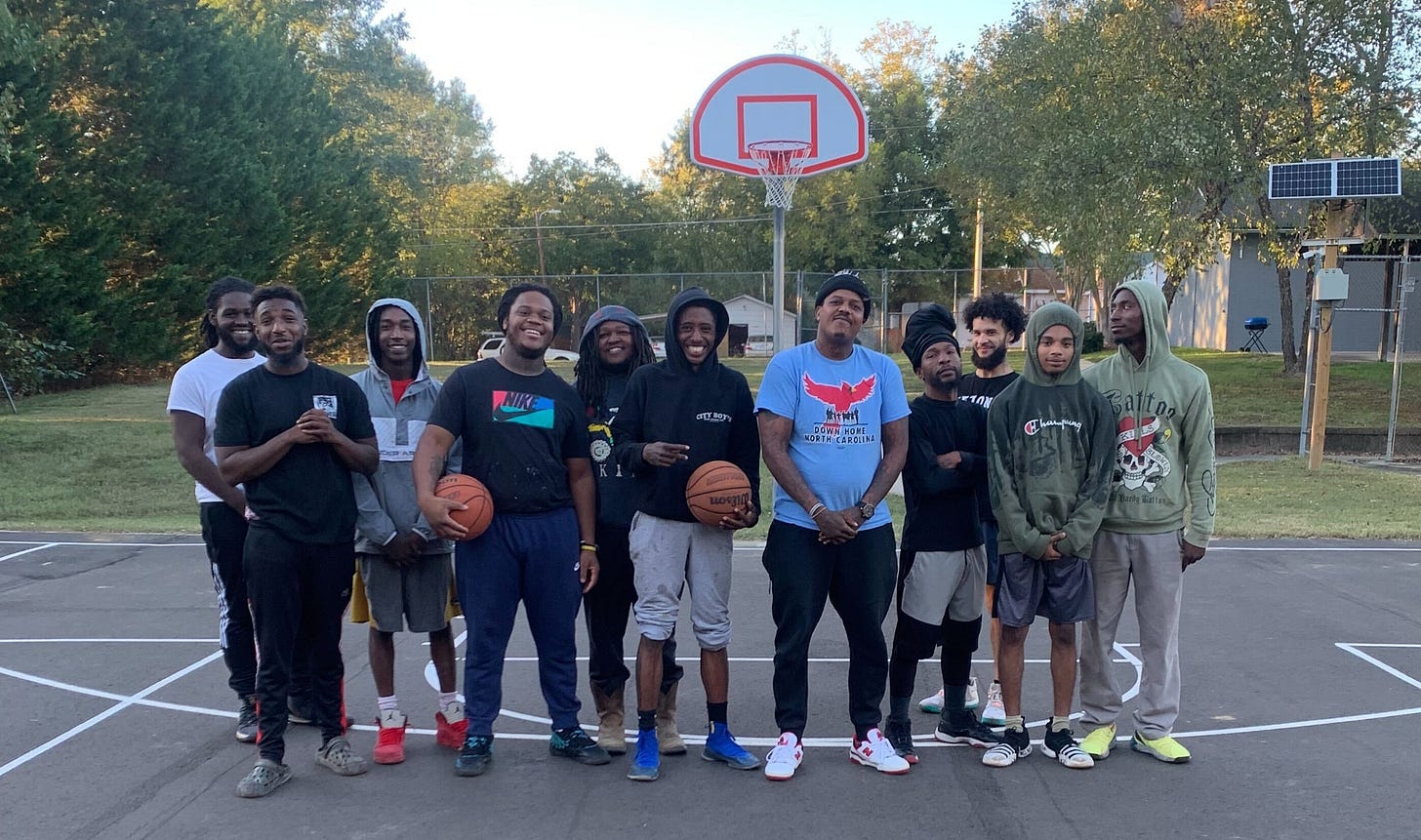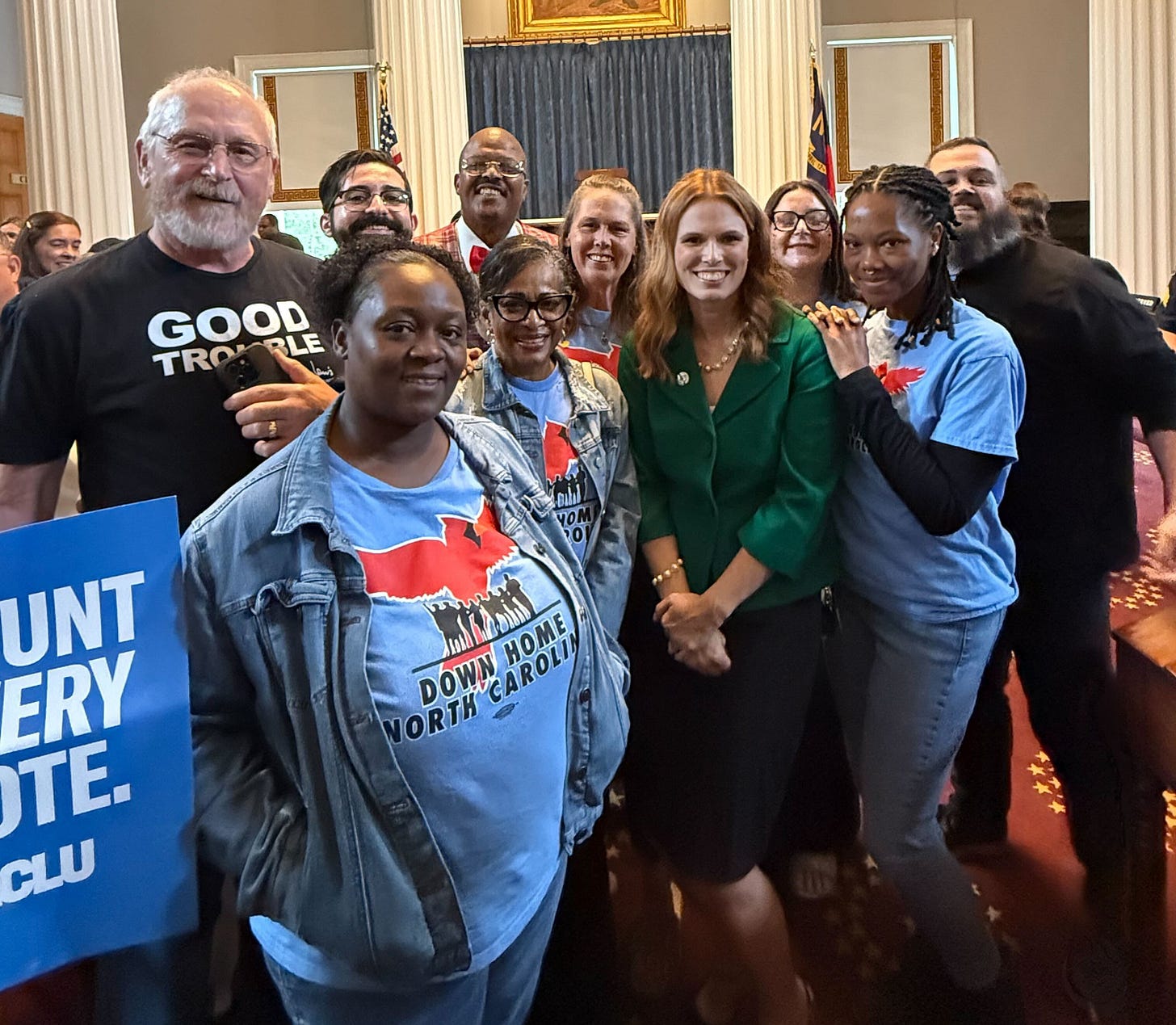Building Power from the Ground Up: Organizing Lessons from North Carolina and Minnesota
Organizing to build power for communities and electoral mobilization are connected strategies that are both critical to realizing a reflective democracy that serves the interests of ordinary people. Yet, electoral work garners the lion’s share of the resources and attention, while year-round organizing to develop leaders, build a constituency base, and advance issue campaigns – work that we know improves our ability to conduct successful voter turnout drives while ensuring winning politicians are accountable to the community – is too often an afterthought.
As the executive directors of two state-based power-building organizations – Faith in Minnesota, a faith-based statewide organizing group, and Down Home North Carolina, a multi-racial organizing group in rural counties – we see firsthand how strong, sustained organizing work rooted in local leaders and their interests can fuel powerful electoral programs, lead to wins that have statewide significance, and make democracy work for people after election day.
From the Basketball Court to the Supreme Court in North Carolina
In the town of Oxford in Granville County, North Carolina, Jason Dunkin, a grassroots leader with Down Home, wanted to revive a neighborhood park and basketball court. The town had cut funding for the park in the 1990s, a time when Oxford was struggling with high unemployment and a drug crisis, citing budget shortfalls and claiming the park was overrun with criminal activity.
It is worth a brief foray into the town’s past. In 1970, white residents of Oxford murdered a 23-year-old Black veteran named Henry Marrow. They were later acquitted by an all-white jury. The Black community mobilized, holding a series of marches and protests and coordinating a boycott of white-owned businesses. This organizing bore fruit, including progress in desegregating downtown businesses and Oxford’s public schools and expanded job opportunities for Black residents who had for years been shut out of hiring. The town’s history, with its deep scars of racism and proud legacy of powerful organizing, is an important backdrop to Jason and Down Home’s organizing in Oxford.
Down Home organizers met Jason for the first time during a series of listening sessions they held in Oxford in 2022. He and other residents raised concerns about the lack of public spaces and activities for young people in their community. Following the listening sessions, Jason and other emerging grassroots leaders from Oxford attended a Down Home leadership training – or “boot camp” – during which they conceived a campaign to restore funding for and renovate the park. They mapped out power relationships in the county and mobilized residents to put pressure on county officials. During the campaign, they recruited older basketball players who used to play on the court – and some of whom had gone on to play college ball and professionally overseas – to speak at county commissioner meetings. For most, it was the first time in their lives they had attended such a meeting. One commissioner, Bryan Cohn, worked closely with Jason and his team to champion their cause.
Ultimately, Jason and his peers succeeded in getting the county to allocate unused federal COVID recovery funds to restore the park.
This victory energized Jason and other Down Home members and they plunged themselves into electoral work. In 2022, they helped elect Sheriff Robert Fountain, Jr., the first-ever Black sheriff in Granville County’s then 276-year history. And when Bryan Cohn – their champion from the Granville County Commission on the park campaign – decided to run for a North Carolina House seat in 2024, the team endorsed his candidacy, ran a phone bank, and contacted more than 4,700 people through door-to-door canvassing to get out the vote on his behalf. Cohn beat the Republican incumbent by 228 votes. His victory broke the Republican supermajority in the North Carolina state legislature, restoring the Democratic Governor’s power to veto a slew of harmful bills cooked up by the Republican-led state legislature.
Jason’s story illustrates how powerful local organizing and leadership development can cascade up to state-level impact. It was the campaign to restore their local park that brought Jason and his Oxford neighbors into a co-governing relationship with Bryan Cohn and motivated them to hit the streets to support his candidacy for the North Carolina House. Without a doubt, their efforts were decisive in pushing Cohn to his razor-thin victory.
And their impact went beyond breaking the Republican supermajority: Jason and his fellow leaders helped cure ballots in the election of North Carolina Supreme Court Justice Allison Riggs, who beat her Republican opponent by a scant 734 votes in last year’s election. When Riggs’s opponent initiated litigation to contest the validity of 65,000 votes in that election, Jason and his team were poised to mobilize a large-scale ballot curing campaign to ensure that every vote was counted.
Building Power in Manufactured Home Parks in Minnesota
In Minnesota, manufactured home parks have emerged as somewhat unlikely power centers in the state’s political landscape, thanks to deliberate and strategic organizing efforts. The parks are unique spaces. Some 180,000 Minnesotans live in manufactured home parks, and they are filled with racially diverse groups of working class people who are often apolitical or politically conflicted. At the same time, many of the parks are located in contested state legislative districts.
In recent years, private equity firms have bought up manufactured home parks in Minnesota. To drive up their profits, the firms have cut budgets for services and maintenance and hiked lot rents, often by hundreds of dollars per year. These rent increases are squeezing residents, many of whom live at the margins, are still paying mortgages for their homes on top of the rents, and – despite the moniker of “mobile” homes – are constrained from going elsewhere due to moving costs that top $10,000.
Faith in Minnesota has organized residents of manufactured home parks across Minnesota to fight for state legislation to cap exorbitant increases in their lot rents. During last year’s election, these leaders targeted a set of state legislators who have manufactured home parks in their districts, calling on them to champion legislation that would cap lot rent increases at 3% per year. One of those legislators, Democrat Matt Norris, became the lead author and sponsor of the bill. Because of his strong support for the legislation, Faith in Minnesota backed his re-election bid, contacting 1,139 manufactured home residents through door-to-door canvassing in his district and pushing him over the top in a race he won by just 410 votes. Norris’s victory in one of the Minnesota Democratic-Farmer-Labor Party’s most vulnerable seats was critical to enabling the party to keep a foothold on power in the Minnesota House, where they currently have a 50/50 split and a power sharing agreement with Republicans.
Two of the most important leaders of the campaign are Gwen, a middle-aged Black woman who retired from UPS and has since returned to the workforce as a Walmart security guard to make ends meet; and Tami, a white woman who retired from a career at an accounting firm. Gwen and Tami are comrades-in-arms in this campaign, who, despite their different backgrounds, both care deeply about the people in their community, believe private equity is screwing them over, and share a self interest in and commitment to fighting back against the economic predations they are experiencing.
The state legislature has advanced but has yet to enact the bill capping lot rents in manufactured home parks. Tami and Gwen and their peers understood that this would be a multi-year effort – that winning elections would be a critical part of a successful campaign strategy, but on its own insufficient to yield victory. They would need to build a strong base in manufactured home parks across the state and mobilize ongoing pressure on elected officials to back their interests. In short, they needed a powerful and sustained organizing effort – not just a one-time voter mobilization campaign.
Lessons
What can we learn from these examples? For starters, we know that if we go deep with our leaders, we can have a big impact.
When voting has a strategic connection to campaigns that aim to address concrete quality of life issues, people who are otherwise disengaged from politics and skeptical about the top of the ticket are more likely to participate. And when organizing groups like ours strategically engage candidates to secure their commitments to taking real steps to address these issues, and then back the candidates up with effective electoral mobilization, they can both tip the scales in a tight election and build real co-governing power to advance their policy goals.
The impacts of local campaigns like these can reverberate upward and outward in significant ways. A fight for a local basketball court and park can generate grassroots energy and power that leads to the breaking of a Republican supermajority and the election of a state supreme court justice. A fight over rent gouging at manufactured home parks can prevent a Republican takeover of the Minnesota House of Representatives and plant the seeds for a new policy that would materially improve 180,000 Minnesotans' lives.
And in less measurable but important and profound ways, these campaigns show people they have agency when they are part of an organized group, and that they can make government and democracy work for their communities. The Oxford basketball players who had never before set foot in a county commission meeting learned that their voices could make a difference in improving their community. The manufactured home park residents are learning that if they come together, they can fight deep-pocketed private equity firms and win. The experience of political agency that comes through winning local campaigns like these is critical to countering people’s sense of cynicism and hopelessness about politics and to realizing the promise of American democracy.
The campaigns we’ve described aren’t outliers. All across the country, there are organizations committed to rigorous organizing and grassroots leadership development that are achieving significant electoral impact, shifting the political dynamics in their states, and winning new policies that materially improve people’s lives. Funders who want to support successful election efforts and strengthen democracy should take notice.
Dreama Caldwell is Co-Executive Director of Down Home North Carolina. Down Home North Carolina is building power with poor and working-class people in North Carolina’s small towns and rural communities.
Minister JaNaé Bates is the Co-Executive Director for Faith in Minnesota – a political home for people of faith who are acting boldly and prophetically to create a new, people-centered politics in Minnesota.







